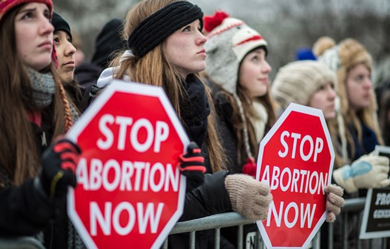Back in January, House Republican leaders cancelled a vote on a 20-week abortion ban, the top legislative priority of anti-choice groups, shortly before it was scheduled to take place on the anniversary of Roe v. Wade. A group of more moderate anti-choice Republicans, led by Rep. Renee Ellmers, had objected to language that exempted rape survivors from the ban only if they had reported the assault to law enforcement first, which Ellmers said “further victimized the victims of rape.”
Anti-choice groups were furious and have been holding protests outside the offices of House Republican leaders demanding a new vote on the bill. It seems that they have now gotten their wish.
A number of outlets are reporting that the House leadership has scheduled a vote next week on the 20-week ban after months of negotiations about the rape exception. According to news reports, while the requirement that rape survivors file a police report is no longer in the bill, they are now required to present evidence that they “have received either medical treatment or licensed counseling at least 48 hours prior to the late-term procedure.”
According to LifeNews, the bill also includes an “informed consent” requirement that notifies women “of the age of her baby and the requirements under the law” and includes language making it easier to sue abortion providers.
The Weekly Standard reports that National Right to Life Committee and the Susan B. Anthony List are both behind the new version of the bill:
In 2013, the House passed the bill, called the “Pain Capable Unborn Child Protection Act,” which included exceptions in the cases of rape, incest, and when a physical health issue endangers the life of the mother. But an effort to pass identical legislation in the new Congress was scrapped in January on the eve of the annual March for Life because some GOP members, led publicly by Rep. Renee Ellmers of North Carolina, objected to the bill’s reporting requirement for late-term abortions in the case of rape. The bill required the crime to be reported to law enforcement officials at any point prior to performing a late-term abortion.
According to House Republicans, that requirement has been removed from the bill. Instead, the legislation requires abortion doctors to ensure that victims have received either medical treatment or licensed counseling at least 48 hours prior to the late-term procedure. With that change, the bill has assuaged the concerns of those Republican members while still garnering strong support of national pro-life groups, including the National Right to Life Committee and the Susan B. Anthony List.
“I’m proud we’ve gotten to a point where we found a consensus between our members and the pro-life groups out there,” said Rep. Diane Black of Tennessee.
The fact that there was a rape exception in the bill at all was the result of last-minute negotiations on a previous version of the bill after its sponsor, Trent Franks, made a Todd Akin-like remark about pregnancy from rape being rare. As we explore in our recent report on the “personhood” movement, rape exceptions are extraordinarily divisive within the anti-choice community. The National Right to Life Committee’s decision to support the Franks bill even with the narrow rape exception caused a number of state anti-choice groups to form a rival organization that pushes for “no exceptions” anti-choice policies.
Blogger Jill Stanek reports that one person involved in the negotiations on the current version 20-week ban told her, “This is the most complicated bill I’ve ever worked on.”







